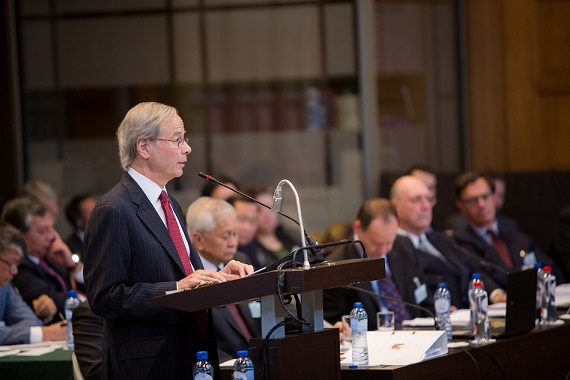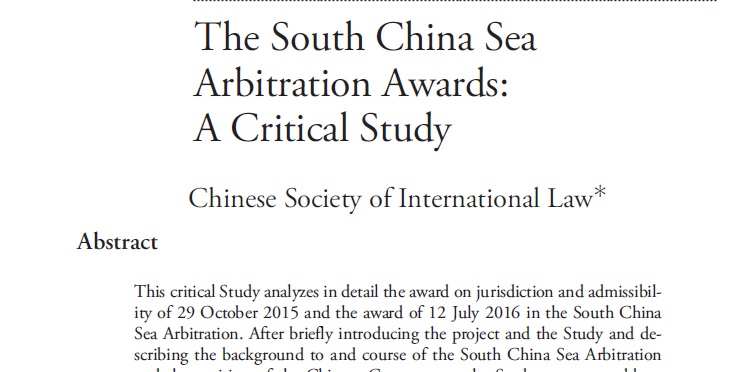Former foreign secretary Albert Del Rosario on Monday accused President Rodrigo Duterte of betraying the public’s trust, an impeachable offense, for failing to stand up to China and assert the country’s claims in the West Philippine Sea (WPS) as upheld by the 2016 arbitral ruling in The Hague.
“For the last five years, what we see is a betrayal of the Filipino people,” he said in a statement at a webinar marking the fifth anniversary of the landmark decision. “Is it not about time for Filipinos to reject this man and what he represents?”
Del Rosario, who was part of the government’s team that filed the case in the Permanent Court of Arbitration in 2013, condemned Duterte’s move to set aside the arbitral ruling rejecting Beijing’s controversial nine-dash line claims in the South China Sea. He said the President violated the Constitution when he ordered the Philippine Navy to conduct patrols only within the country’s 12-nautical mile territorial seas instead of the 200-nautical mile exclusive economic zone (EEZ) and entered into a verbal agreement with Chinese President Xi Jinping allowing Chinese fishermen to fish in the country’s waters.
Del Rosario likewise rejected Duterte’s “false assertion” that China is already in possession of the WPS and that the arbitral ruling is a mere scrap of paper he could throw the trash can. The former foreign secretary said that the President’s actions “fit into a disturbing pattern of loyalty to a foreign power” illegally occupying land and waters that belong to the Filipino people.
“With less than a year left until the end of President Duterte’s term in June 2022, his record of asserting the rights of Filipinos in the West Philippine Sea has been abysmal,” del Rosario said.
Professor Renato de Castro of De La Salle University-Manila, however, noted that Duterte’s appeasement policy towards China is now being challenged by officials in his administration who are considering a strategy called “limited hard balancing.”
“There are two current clashing views within this administration. President Duterte and some of his close advisors are still determined to pursue the appeasement policy, but some segments in the military and foreign affairs department are starting to question the wisdom and prudence of appeasing a regional power bent on maritime expansion,” he said.
In a rare move last March, Defense Secretary Delfin Lorenzana accused China of violating the Philippines’ maritime rights and encroaching into the country’s territory when over 200 militia boats were spotted around Whitsun Reef, west of Palawan. He likewise ordered maritime patrols of the WPS and the Kalayaan Island Group to continue as he ordered the Chinese boats to leave the area.
This was followed by an order by Foreign Secretary Teddy Boy Locsin that a diplomatic protest be issued to China every day until the boats pull out.
“As the term of the Duterte administration comes to an end, and I think this will become more apparent by the election period, this appeasement policy is being challenged within this administration. In fact, my argument right now is that it is moving towards a policy of limited challenge to China,” de Castro said. Hopefully, the next administration will learn something from what is going on in this administration. The bottom line here is that there is simply no point in appeasing an expanding power –– like for example China, because whether you are a Chinese friend or not, China will pursue its maritime goal of expansion.”
Strategies proposed
Both former U.S. Ambassador to the Philippines Harry Thomas and former Australian Foreign Minister Julie Bishop emphasized the importance of multilateralism in upholding the arbitral victory as they pressed for the need to uphold a rules-based international order.
Thomas pointed to the need for members of the Association of Southeast Asian Nations (ASEAN) to unite and come up with a “shared agreement” on the South China Sea dispute because for as long as members of the regional grouping are “fighting,” the claims of the coastal states in the disputed area would be weak and China would take advantage of the situation.
But former Supreme Court Justice Antonio Carpio said that the arbitral award is a unifying force among ASEAN coastal states since the ruling automatically means that the UN Convention on the Law of the Sea ( UNCLOS) also applies to their claims in the South China Sea.
“The declaration in the arbitral award invalidating China’s nine-dash line is the glue that holds ASEAN coastal states together. This is where their national interests meet and converge,” he pointed out.
Carpio said these coastal states should come up with a common strategy in defending their EEZs to strengthen their individual efforts. The best way to do this, according to him, is for these countries to conduct joint maritime patrols within each other’s EEZs without regard to China’s claims.
“These joint patrols are a lawful and peaceful exercise of their rights under UNCLOS which allows coastal states to patrol their EEZs to prevent poachers or rather parties from illegally taking living or non-living resources within (these areas),” he said.
Carpio noted that naval powers outside the region such as the United States, the United Kingdom, France, Japan, Australia, Germany, and the Netherlands have a deep interest in peace and stability in the South China Sea, which is a vital international waterway where foreign warships are allowed to sail and conduct naval drills.“
The strongest and most robust enforcement of the arbitral award is the conduct of the freedom of navigation operations and naval drills by the US and its allies in the West Philippine Sea,” he said. “There is therefore a convergence of interests between the Philippines on one hand and the US and its allies on the other hand, to demonstrate to China and to the world that the Philippines has an EEZ in the West Philippine Sea unimpaired by China’s nine-dash line.”
He urged the Philippines and the other ASEAN coastal states to welcome and join these naval exercises which could lead to common strategies.
“In this way, the arbitral award is enforced most effectively and all the ASEAN coastal states will be assured that their EEZs are respected and cannot be taken away from them by China or by any other state,” Carpio said.
Professor Mely Caballero-Anthony of Singapore’s Nanyang Technological University agreed, adding that ASEAN members should also be open to working with the Quadrilateral Security Dialogue, a strategic security forum among the U.S., Japan, Australia, and India.
Jay Sebastian is a student of the University of the Philippines writing for VERA Files as part of his internship.


